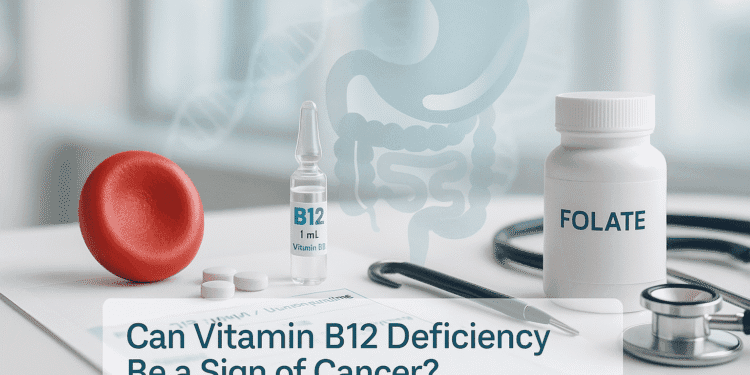Can Vitamin B12 Deficiency Be a Sign of Cancer? Understanding the Complex Connection
Have you ever wondered if that persistent fatigue or those strange neurological symptoms could be telling you something more serious about your health? When it comes to vitamin B12 deficiency, the relationship with cancer is more nuanced than you might expect. While low B12 levels don’t automatically signal cancer, understanding this connection could be crucial for your health.
Let’s dive deep into this complex topic and explore when B12 deficiency might be a red flag worth investigating further.
What is Vitamin B12 and Why Does Your Body Need It?
Think of vitamin B12 as your body’s cellular powerhouse manager. This water-soluble vitamin plays a starring role in keeping your nervous system healthy, producing red blood cells, and maintaining your DNA. Without adequate B12, your body essentially starts running on empty.
The Role of B12 in Cellular Function
Your cells depend on B12 for proper DNA synthesis and repair. It’s like having a skilled mechanic ensuring all your cellular machinery runs smoothly. When B12 levels drop, this cellular maintenance becomes compromised, potentially leading to various health issues.
B12 also works hand-in-hand with folate to produce healthy red blood cells. Without enough B12, you end up with larger, less functional red blood cells that can’t carry oxygen efficiently throughout your body.
How Your Body Absorbs Vitamin B12
Here’s where things get interesting from a cancer perspective. B12 absorption is a complex process that begins in your stomach. Your stomach produces a protein called intrinsic factor, which binds to B12 and allows it to be absorbed in your small intestine.
This intricate absorption pathway is where cancer can potentially interfere. When cancers affect the stomach, pancreas, or small intestine, they can disrupt this delicate process, leading to B12 deficiency even if you’re consuming adequate amounts through diet.
Understanding Vitamin B12 Deficiency: Symptoms and Causes
Before we explore the cancer connection, let’s establish what B12 deficiency looks like and why it occurs.
Common Signs of B12 Deficiency
B12 deficiency is often called “the great masquerader” because its symptoms can mimic many other conditions. You might experience:
- Persistent fatigue and weakness that doesn’t improve with rest.
- Neurological symptoms like tingling in hands and feet.
- Memory problems or difficulty concentrating.
- Mood changes, including depression or irritability.
- Pale skin or a yellowish tint.
- Shortness of breath and heart palpitations.
These symptoms develop gradually, which is why many people don’t realize they have a deficiency until it becomes severe.
Primary Causes of Low B12 Levels
Understanding why B12 deficiency occurs helps us identify when cancer might be a contributing factor.
Dietary Factors
Vegans and vegetarians face the highest risk of dietary B12 deficiency since this vitamin is primarily found in animal products. However, dietary deficiency alone rarely leads to the severe complications we see with cancer-related B12 deficiency.
Absorption Issues
This is where cancer enters the picture. Several conditions can interfere with B12 absorption:
- Pernicious anemia (an autoimmune condition).
- Stomach surgery or gastric cancer.
- Pancreatic insufficiency.
- Small bowel diseases or tumors.
- Certain medications.
The Connection Between B12 Deficiency and Cancer: What Research Shows
Now we’re getting to the heart of the matter. The relationship between B12 deficiency and cancer isn’t straightforward – it’s more like a complex web of interconnected factors.
Direct vs. Indirect Relationships
Research shows that B12 deficiency can be both a consequence of cancer and potentially a contributing factor to cancer development. This bidirectional relationship makes it challenging to determine cause and effect.
Some studies suggest that severe B12 deficiency might increase cancer risk by impairing DNA repair mechanisms. When your cells can’t properly maintain their genetic material, mutations become more likely.
Types of Cancer Associated with B12 Deficiency
Certain cancers show stronger associations with B12 deficiency than others:
- Gastric (stomach) cancer – the strongest connection.
- Pancreatic cancer.
- Small intestine cancers.
- Certain blood cancers.
The strength of these associations varies, and it’s important to remember that correlation doesn’t always equal causation.
Stomach Cancer and B12 Deficiency: The Strongest Link
If there’s one cancer that healthcare providers worry about when they see unexplained B12 deficiency, it’s stomach cancer.
How Stomach Cancer Affects B12 Absorption
Stomach cancer can interfere with B12 absorption in several ways. Tumors can destroy the cells that produce intrinsic factor, making it impossible for your body to absorb B12 effectively. Additionally, stomach cancer often leads to reduced stomach acid production, which is necessary for releasing B12 from food proteins.
This creates a perfect storm where even adequate dietary B12 intake can’t prevent deficiency.
Pernicious Anemia as a Warning Sign
Pernicious anemia, an autoimmune condition that destroys intrinsic factor-producing cells, significantly increases stomach cancer risk. People with pernicious anemia have a 2-3 times higher risk of developing gastric cancer compared to the general population.
This connection is so well-established that many doctors recommend regular endoscopic screening for people with pernicious anemia, especially those over 50.
Other Cancers That May Cause B12 Deficiency
While stomach cancer grabs most of the attention, other malignancies can also lead to B12 deficiency.
Pancreatic Cancer and Nutrient Malabsorption
Pancreatic cancer can cause B12 deficiency through multiple mechanisms. The pancreas produces enzymes necessary for separating B12 from food proteins. When pancreatic function is compromised, this separation process becomes inefficient.
Additionally, pancreatic cancer often causes bile duct obstruction, which can interfere with the overall digestive process and nutrient absorption.
Small Intestine Cancers
Since the final step of B12 absorption occurs in the terminal ileum (part of the small intestine), any cancer affecting this area can lead to deficiency. Small bowel lymphomas, in particular, have been associated with B12 deficiency.
Crohn’s Disease and Cancer Risk
Crohn’s disease, which commonly affects the terminal ileum, can cause both B12 deficiency and increased cancer risk. This creates a complex scenario where inflammation, malabsorption, and cancer risk intersect.
When B12 Deficiency Might NOT Indicate Cancer
It’s crucial to understand that most cases of B12 deficiency are NOT related to cancer. Let’s explore the more common, benign causes.
Age-Related Absorption Issues
As we age, our stomachs produce less acid and intrinsic factor, making B12 absorption less efficient. This natural aging process affects up to 30% of people over 50 and rarely indicates underlying cancer.
Medication-Induced Deficiency
Several common medications can interfere with B12 absorption:
- Metformin (diabetes medication).
- Proton pump inhibitors (acid reflux medications).
- H2 receptor blockers.
- Some antibiotics.
If you’re taking any of these medications long-term, regular B12 monitoring is important.
Dietary Restrictions and Veganism
People following strict vegan diets are at high risk for B12 deficiency simply due to lack of dietary sources. This type of deficiency typically develops slowly over several years and isn’t associated with cancer risk.
Warning Signs That Require Immediate Medical Attention
While most B12 deficiency cases aren’t cancer-related, certain red flags warrant urgent evaluation.
Red Flag Symptoms to Watch For
Seek immediate medical attention if B12 deficiency occurs alongside:
- Unexplained weight loss.
- Persistent abdominal pain.
- Blood in stool or black, tarry stools.
- Severe fatigue that developed rapidly.
- Difficulty swallowing.
- Persistent nausea and vomiting.
These symptoms, combined with B12 deficiency, could indicate an underlying malignancy requiring prompt investigation.
When to See Your Doctor
Don’t wait if you’re experiencing multiple symptoms of B12 deficiency, especially if they’re severe or rapidly worsening. Early detection and treatment of both B12 deficiency and any underlying conditions lead to better outcomes.
Diagnostic Tests: How Doctors Investigate B12 Deficiency
When healthcare providers suspect a connection between B12 deficiency and cancer, they use a systematic approach to investigation.
Blood Tests and Biomarkers
The diagnostic workup typically starts with:
- Serum B12 levels.
- Methylmalonic acid (MMA) levels.
- Homocysteine levels.
- Complete blood count.
- Intrinsic factor antibodies.
These tests help determine not just whether you’re deficient, but also the likely cause of the deficiency.
Advanced Imaging and Screening
If initial tests suggest malabsorption or if red flag symptoms are present, doctors may recommend:
- Upper endoscopy to examine the stomach.
- CT scans of the abdomen and pelvis.
- MRI imaging in specific cases.
- Specialized tests for pancreatic function.
Endoscopy and Biopsy Procedures
Upper endoscopy allows direct visualization of the stomach lining and can detect early-stage gastric cancer. During this procedure, doctors can take tissue samples if any abnormal areas are identified.
Treatment Approaches for B12 Deficiency
Treatment strategies vary depending on the underlying cause and severity of deficiency.
B12 Supplements and Injections
For most people, B12 deficiency can be effectively treated with:
- High-dose oral supplements (1000-2000 mcg daily).
- Sublingual (under-the-tongue) preparations.
- Intramuscular injections for severe deficiency or absorption issues.
- Nasal sprays in specific cases.
The route and duration of treatment depend on the underlying cause and individual response.
Addressing Underlying Causes
When cancer is identified as the cause of B12 deficiency, treatment focuses on managing the malignancy while simultaneously addressing the nutritional deficiency. This often requires ongoing B12 supplementation even after cancer treatment.
Prevention Strategies and Risk Reduction
While you can’t prevent all causes of B12 deficiency, several strategies can reduce your risk.
Dietary Recommendations
Ensure adequate B12 intake through:
- Regular consumption of animal products (meat, fish, dairy, eggs).
- Fortified foods for vegetarians and vegans.
- B12 supplements, especially for high-risk groups.
Adults over 50 should consider B12 supplements regardless of diet due to age-related absorption changes.
Regular Health Screenings
Stay proactive about your health with:
- Annual blood work that includes B12 levels.
- Regular check-ups to monitor for symptoms.
- Appropriate cancer screening based on age and risk factors.
- Discussion with your healthcare provider about family history and risk factors.
Conclusion
The relationship between vitamin B12 deficiency and cancer is complex but important to understand. While most cases of B12 deficiency aren’t cancer-related, certain situations – particularly involving stomach cancer – show strong associations that warrant careful evaluation.
The key takeaway is that unexplained B12 deficiency, especially when accompanied by red flag symptoms like unexplained weight loss, persistent abdominal pain, or blood in the stool, should prompt thorough medical investigation. Early detection of both B12 deficiency and any underlying conditions leads to better treatment outcomes and improved quality of life.
Remember, knowledge is power when it comes to your health. Stay informed about your B12 levels, maintain a balanced diet, and don’t hesitate to seek medical attention if you’re experiencing concerning symptoms. Your proactive approach to health monitoring could make all the difference in catching potential issues early.
Frequently Asked Questions
1. How quickly can B12 deficiency develop into a serious problem?
B12 deficiency typically develops slowly over months to years because your liver stores significant amounts of B12. However, when caused by malabsorption due to cancer, the deficiency can progress more rapidly and become severe within weeks to months, depending on your initial B12 stores and the extent of absorption impairment.
2. Can B12 deficiency cause cancer, or does cancer cause B12 deficiency?
The relationship works both ways, but cancer causing B12 deficiency is more common and better established. Severe, long-term B12 deficiency may increase cancer risk by impairing DNA repair mechanisms, but this is less common than cancers (particularly stomach cancer) causing B12 deficiency through malabsorption.
3. What’s the difference between dietary B12 deficiency and cancer-related B12 deficiency?
Dietary B12 deficiency develops gradually over years and responds well to oral supplements. Cancer-related B12 deficiency often occurs despite adequate dietary intake, may develop more rapidly, and typically requires injections or high-dose supplements due to absorption problems. Cancer-related deficiency is also often accompanied by other concerning symptoms.
4. Should everyone with B12 deficiency be screened for cancer?
Not everyone with B12 deficiency needs cancer screening. However, screening is recommended for people over 50 with unexplained B12 deficiency, those with red flag symptoms (weight loss, abdominal pain, blood in stool), individuals with pernicious anemia, or anyone with risk factors for gastric cancer such as family history or H. pylori infection.
5. How long does it take for B12 levels to return to normal after starting treatment?
B12 levels typically begin improving within days to weeks of starting treatment, but full normalization can take 2-3 months. Neurological symptoms may take longer to improve, sometimes requiring 6-12 months of treatment. If levels don’t improve as expected, it may indicate ongoing malabsorption or the need for higher doses or injection therapy.
Please don’t forget to leave a review.









